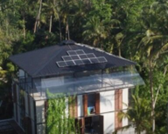Clean energy sources have grown more
prevalent in South Africa as the need for environmentally friendly power grows.
Despite their proven benefits, several persistent misconceptions surround solar
energy systems. This article dispels these myths, clarifying for South African
homeowners considering the transition to solar power.

Solar Energy Is Ineffective in
Overcast or Cloudy Weather
One prevalent myth suggests solar panels
are only effective in direct sunlight and won't generate electricity on cloudy
or overcast days. In reality, solar panels can still produce energy in diffused
light conditions. While their efficiency may decrease slightly during cloudy
weather, modern solar technology is designed to capture sunlight even when it's
not glaringly bright. South Africa's ample sunlight throughout the year ensures
that solar panels remain a viable and efficient energy source, even on cloudy
days.
Solar Panels Require Constant
Maintenance
Another common misconception is that solar
panels demand extensive and costly maintenance. In truth, solar panels are
low-maintenance and durable. Routine cleaning to remove dust or debris can
optimize performance, but they generally require minimal attention. Most solar
systems come with warranties, and reputable installers offer maintenance plans
to address any issues that may arise. South African homeowners can enjoy the
benefits of solar energy without the burden of constant upkeep.
Solar Energy Systems Are Exclusively
for Wealthy Homeowners
Some believe that solar energy systems for homes in south africa
are a luxury only affordable for wealthy homeowners. In reality, the costs
associated with solar installations have significantly decreased over the
years. Various financing options, government incentives, and rebates make solar
power more accessible and affordable for a broader range of homeowners. The
long-term savings on electricity bills often outweigh the initial investment,
making solar energy a practical and cost-effective choice for many South
African households.

Solar Panels Have a Short Lifespan
A persistent myth suggests solar panels
have a short lifespan and need frequent replacement. In truth, quality solar
panels are designed to last for decades. Most panels come with warranties
ranging from 25 to 30 years, and they often continue to generate electricity
beyond the warranty period. Regular advancements in solar technology contribute
to increased durability and efficiency, ensuring that solar panels remain a
reliable and long-lasting investment for South African homeowners.
Solar Energy Is Only Viable in
Certain Regions
Some believe that solar energy is only
practical in specific regions with constant sunlight, excluding South Africa.
Contrary to this misconception, South Africa is rich in sunlight, with high
solar irradiance levels. The country's geographical location makes it
well-suited for solar energy generation. Solar panels can be effective in
various climates, improving efficiency continually. South African homeowners
nationwide can benefit from solar energy systems, regardless of their location.
Conclusion
Dispelling common myths and misconceptions
about solar energy systems is essential for South African homeowners
considering the switch to renewable energy. Individuals may make educated
decisions that match their ecological and financial goals by recognizing the
reality behind these myths.
As the need for alternative forms of
energy develops, dispelling these misunderstandings is critical to promoting
the broad use of solar power. With its abundant sunlight and the potential for
significant energy savings, South Africa stands to gain substantially from a
more accurate understanding of the capabilities and benefits of solar energy
systems.
Solar energy is a viable, cost-effective,
and sustainable option for South African homes, contributing not only to
reduced electricity bills but also to a greener and more environmentally
conscious future. As the solar industry continues to evolve, debunking these
myths will pave the way for a more informed and sustainable energy landscape in
South Africa.
